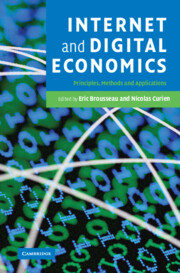Book contents
- Frontmatter
- Contents
- List of figures
- List of tables
- Notes on contributors
- Acknowledgements
- 1 Internet economics, digital economics
- Part I Toward a new economy?
- Part II On-line communities
- Part III Network externalities and market microstructures
- Part IV Producing, distributing and sharing information goods
- Part V How e-markets perform
- Part VI Evolving institutional infrastructures
- Part VII The impacts of the Internet at the macro level
- 23 Mobile telephony and Internet growth: impacts on consumer welfare
- 24 Globalization, the Internet and e-business: convergence or divergence in cross-country trends?
- 25 ICTs and inequalities: the digital divide
- References
- Index
25 - ICTs and inequalities: the digital divide
from Part VII - The impacts of the Internet at the macro level
Published online by Cambridge University Press: 22 September 2009
- Frontmatter
- Contents
- List of figures
- List of tables
- Notes on contributors
- Acknowledgements
- 1 Internet economics, digital economics
- Part I Toward a new economy?
- Part II On-line communities
- Part III Network externalities and market microstructures
- Part IV Producing, distributing and sharing information goods
- Part V How e-markets perform
- Part VI Evolving institutional infrastructures
- Part VII The impacts of the Internet at the macro level
- 23 Mobile telephony and Internet growth: impacts on consumer welfare
- 24 Globalization, the Internet and e-business: convergence or divergence in cross-country trends?
- 25 ICTs and inequalities: the digital divide
- References
- Index
Summary
Introduction
At the beginning of the 1990s, authors argued that globalization went hand in hand with the “end of geography”, implying the declining relevance of spatial considerations in shaping patterns of industry organization, owing to the development of information and communication technologies (ICTs) and the Internet (O'Brien, 1992). Virtual space was supposed to act as a substitute for physical space. This naïve thesis was quickly criticized insofar as the Internet is a virtual network strongly rooted in the physical space of geography. But how does space matter in analyzing a network such as the Internet and its economic impacts?
There are several ways to deal with this question. Some papers have emphasized the logistical constraints of the virtual world, more precisely the dialectics induced by the use of ICTs between “de-territorialization” and “re-territorialization” of economic activities. The Internet allows the virtualization of certain aspects of economic activities (online orders for e-commerce, for instance) but implies that other aspects should be embedded in physical space (after-sales service or repair service must be close to customers). Other papers have looked into the geographic impacts of the Internet: are Internet uses biased in favor of agglomeration or dispersion trends? Models of economic geography (Fujita and Thisse, 2000) show that the decline of communication costs through geographical space, as transport costs, tends to polarize more and more economic activities because distance is no longer an obstacle for agglomeration factors such as economies of scale, indivisibilities, social interactions, etc.
- Type
- Chapter
- Information
- Internet and Digital EconomicsPrinciples, Methods and Applications, pp. 693 - 717Publisher: Cambridge University PressPrint publication year: 2007
- 8
- Cited by



